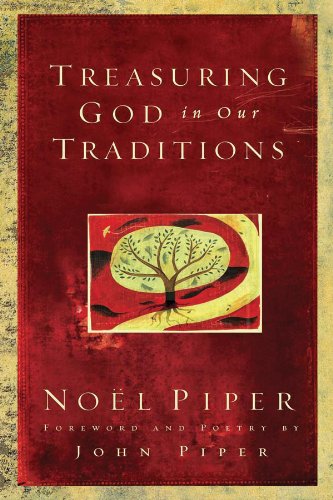Book Review: Treasuring God In Our Traditions

As a wife and mother of three children under the age of five years, I think about my family, and families in general, a lot. I am always looking for guidance from God’s word and from other Christians with wisdom to share. One extremely helpful source has been a book written by Noël Piper, Treasuring God in Our Traditions (Wheaton: Crossway, 2003). Having enjoyed the book, having tried to apply its ideas in my family, and having written about it on my blog (www.168hrs.blogspot.com) I was asked to review it for CASE Magazine.
As the title suggests, the book is about the development of Christian family traditions. In the context of an avowedly post Christian society, ‘family traditions’ have a function that is more critical than ever before, both within our families and in our mission to the wider society.
Traditions create, preserve and express culture. Now that the culture we live in is no longer even nominally Christian, we can expect that the gulf between the traditions of a Christian family and the traditions of the surrounding culture will become wider and wider.
As that cultural gap widens, basic Christian faithfulness will require us to be conscious and deliberate in forming and preserving the traditions that will shape the culture of our families. Gone are the days (if they were ever more than an illusion!) when we could unthinkingly absorb the traditions and patterns of life that we saw in the culture around us and make them the traditions of our families.
The importance of this for our task of passing on the gospel to our children and grandchildren is obvious, but it has an importance beyond the family as well. The task of apologetics involves more than just clever individuals mounting logical arguments that defend Christian beliefs and expose the flaws in alternative belief systems. The New Testament (eg. Titus 2:1-10) calls us not only to defend the gospel with our ideas but also to adorn the gospel by the lives and families and communities that we create.

A crucial way we can contribute to this broader apologetic task is through the example of family culture and traditions that critique the culture and traditions of the wider society. This requires:
a. That our families have a culture of their own;
b. That this culture is consciously, deliberately Christian; and
c. That our families are not insular and selfish but visible and hospitable.
Because, until recently, social traditions have been ‘Christian’ traditions, this is an area that a lot of Christians haven’t given much thought. Noël Piper’s book is a great help in remedying this deficit in our thinking.
Piper’s interest in the ‘traditions’ of families is not really about the cuteness or the warm nostalgic glow they can create; what she is chiefly interested in is the way they can serve the larger task of “laying up God’s words in our hearts and passing his words to the next generation” (p. 26). She writes with warmth and urgency about the importance of developing everyday habits and ways of marking special occasions that communicate to the children growing up within a family that the God of the gospel is at the centre of the family’s life.
But her concern also extends beyond the borders of the family. Piper reminds her readers:
We need to remember, too, that when our traditions are displaying the Treasure of our lives, he is there to be seen by everyone who comes within our circle. Jesus said, “Let you light shine before others, so that they may see your good works and give glory to your Father who is in heaven” (Matthew 5: 16). God wants our family and others to give glory to him because they’ve seen his light through us. Paul says we should be “children of God without blemish in the midst of a crooked and twisted generation, among whom you shine as lights in the world, holding fast to the word of life” (Philippians 2: 15-16).
Much of the book is made up of material that is unique and particular to Noël Piper’s own family—poems written by her husband John for their children’s birthdays, hymns sung for each child and family recipes. Whilst it would be foolish to try to slavishly emulate them all, I still enjoyed the ‘worked example’ they provided of one family’s attempt to create a God-centred, grace-saturated family culture.
Particularly interesting for me were her descriptions of what her family did to celebrate the big, annual occasions (particularly Christmas and Easter). While we haven’t adopted all the Piper family practices for these occasions, her approach to these traditions gave us a framework around which we could make our own traditions. For example, I always knew that I didn’t want Christmas to be about Santa and presents, but Noël Piper helped me to think about positive ways I could make it special for the kids while teaching them about Jesus, gratitude and generosity.
As with most books, I didn’t find everything uniformly convincing. For example, I was not persuaded by the theology of worship that undergirds the final chapter of the book, in which the language of ‘worship’ is used for the ritual gathering of God’s people in the ‘sanctuary’ of the church building, and the atmospherics of the Sunday church service are depicted as the conduit for the congregation members’ encounter with God. But I was thoroughly convinced by her arguments for the importance of the overall theme, and I loved the genuineness and humanity of the way she illustrated it with examples from her own family. I hope that God will use our family and countless other families who read the book to radiate a similar warmth and light in the context in which we live. ©
Leave a comment
Comments will be approved before showing up.



